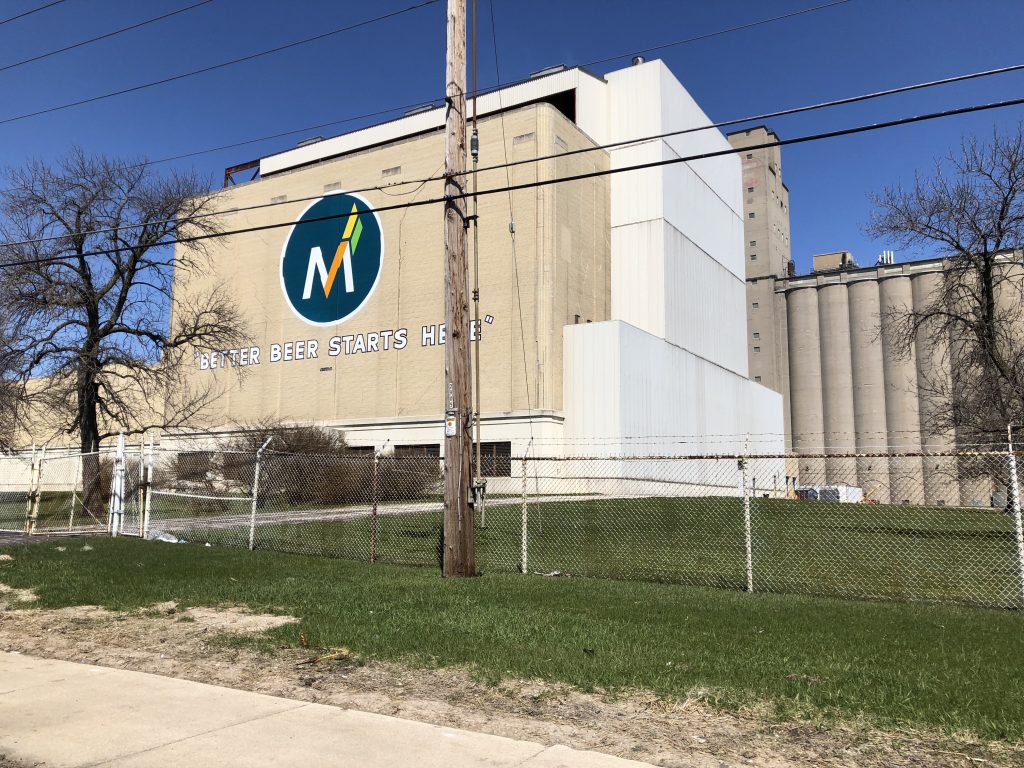Investor Buys Shuttered West Milwaukee Malt Plant
Plus: A recap of the week's real estate news.
A significant piece of Milwaukee’s brewing history has a new owner.
A limited liability company affiliated with Waukesha-based business and real estate investor Tom Beaudry acquired the former Froedert Malt plant at 3830 W. Grant St. in the Village of West Milwaukee.
Bordering the city of Milwaukee on two sides, the plant’s many silos tower over the surrounding area and are visible from Miller Park Way businesses and a number of surrounding neighborhoods. For decades it was a key part in the beer-making supply chain.
The facility was built to process barley into malt, an essential ingredient in beer.
Starting in the 1920s, Froedtert began operating from the complex and by the 1930s, according to the Works Progress Administration, it was the world’s largest malting company. It found a ready base of customers within just a couple of miles of the plant and later counted both Miller and St-Louis-based Anheuser-Busch as large customers.
Froedtert and its multiple malt houses were sold a number of times as the malt industry consolidated alongside the brewing industry. It finally came into the possession of the French company Malteurop in 2008.
The company’s North American headquarters remain in West Milwaukee, as does a distribution center, according to recent press releases from the firm. But the website gives the address of the malt-house complex.
Malteurop still operates plants in Montana, Minnesota and Winnipeg, Canada. As of 2021, it was working to add a fourth plant in Mexico.
The north side of the plant borders the Gannett printing plant, which is due to be similarly shuttered. While it’s unclear what fate awaits either facility, combined they occupy approximately 60 acres between W. Lincoln Ave. and W. Burnham St. Other industrial facilities, including competing malt houses, that border the site have been demolished in recent decades and replaced by strip mall commercial buildings.
When it comes to beer production, the Froedtert name is now a distant memory. But it lives on through Froedtert Health. Kurtis Froedtert, the second-generation leader of the malt company, donated $11 million upon his death in 1951 to create the original Froedtert hospital in Wauwatosa.
Weekly Recap
New Sorority House Rises Near Marquette
The sisters of Pi Beta Phi will soon have their own house adjacent to the Marquette University campus.
Construction is nearing completion on a three-story, 9,432-square-foot house at 1601 W. Kilbourn Ave.
The new house will have the capacity for 24 occupants, according to a city building permit, across what is considered 17 housing units.
Developer Cedar Square will lease the property to the sorority. Cedar Square partner Sonny Bando, of the Santino Group, is serving as the general contractor. Architect Fouad Saab of Saab Design is leading the design. It’s one of many the partners have developed in the area.
ThriveOn Investing $5 Million In Neighborhood Childcare Facilities
The ThriveOn Collaboration intends to invest at least $5 million in childcare and early education providers in the Harambee, Brewers Hill and Halyard Park neighborhoods over the next five years.
The nonprofit collaboration, a partnership of the Greater Milwaukee Foundation and Medical College of Wisconsin, will invest in childcare facilities and improvements to practices for existing providers in the neighborhood.
The collaboration also announced the operator of a new 14,000-square-foot childcare facility will be included on the first floor of its planned ThriveOn King facility, 2153 N. Martin Luther King Jr. Dr. Malaika Early Learning Center will operate the new center in addition to its existing location at 125 W. Auer Ave. The new facility will be able to accommodate 78 children (“seats”) between the ages of six weeks and five years old and will offer subsidized care and private pay tuition options.
“We heard early and often from residents that having quality, affordable options for early childhood education is a pressing need,” said Kathryn Dunn, senior vice president and chief strategy officer for the Greater Milwaukee Foundation, in a statement. “Our approach, all the while, is to be additive to the neighborhoods while supporting the assets and talent already here. This plan offers dual benefit – partnering with a model provider to bring more high-quality seats to the King Drive area for our littlest learners while investing heavily in those already serving the community to enhance quality and access across the board.”
Melvina Park Expansion To Start Later This Year
The City of Milwaukee is lining up all of the necessary pieces to start construction on an expansion of a park adjacent to the Century City Business Park later this year.
The four-acre park, nearly quadruple its current size, will include new playground equipment, a dog park, more trees, an open field for soccer or other games, raised garden beds, basketball courts and a performance/stage area.
The triangular site was cleared by A.O. Smith in the 1970s and 1980s, with much of it becoming an employee parking lot. A small portion on the eastern edge houses the existing park.
Currently known as Melvina Park, it serves as a transition zone between the surrounding neighborhoods and the business park that once saw over 5,000 employees a day build automobile frames. The current park includes aging playground equipment, disused basketball courts and an asphalt play space, while the former parking lots are mostly overgrown with vegetation.
New Apartment Project Not About Cars
A four-story, 53-unit apartment building would replace a string of mostly-vacant buildings on the 1500 block of E. North Ave. under a proposal from developer Ryan Pattee and real estate agent Shar Borg.
Unlike many new apartment buildings, the new building would cater to residents that don’t own a car.
“We’re trying to help small households thrive without having to own cars, or at least own fewer of them,” said Pattee in an interview. The building would have a mix of one-bedroom and studio apartments.
“If you are spending $1,000 a month on rent, do you want to be spending almost that much on your car?” said Borg, referencing the estimated $9,500 annual cost of vehicle ownership.
Community Land Trust Comes To Town
A new model of homeownership aims to provide affordable housing and stabilize neighborhoods in Milwaukee.
The Milwaukee Community Land Trust (MCLT) aims to make houses it invests in permanently affordable while still building wealth for the families that own the homes.
Funding from the city, unanimously approved Tuesday morning, would allow the new, 501(c)(3) organization to test the model on five houses. The Common Council committed to providing $200,000 to the effort.
The program, versions of which are in place in more than 200 other locations in the nation, works by splitting ownership of the underlying land and house.
State’s Black and Hispanic Renters Struggling
Large numbers of Black and Hispanic people in Wisconsin are behind on their rent, according to a new report. The report by HelpAdvisor, an online resource that compiles information largely about federal and state benefits, shows that nearly half of African American renters in Wisconsin are behind on rent. Wisconsin has the highest rate of rent delinquency for Black residents of any state and the third highest rate for Hispanic renters. The report drew from the U.S. Census Bureau’s Household Pulse Survey for the period from March 2-14. The survey was released on March 23.
“Millions of Americans are struggling to keep up with their rent payments in 2022, and Black and Hispanic renters are disproportionately behind on their payments,” the report concludes.
“We knew that rent was rising and mortgage costs, but we wanted to look at how those rising costs are impacting renters,” Matt Clements, a senior editor at HelpAdvisor, told Wisconsin Examiner. As HelpAdvisor researchers combed through the data, they saw that “the disparity along racial lines was pretty stark.”
In Wisconsin, 47.4% of Black renters are behind on their rent, according to the survey data, eclipsing the national average for that group of 19.9%. In addition, 31% of Hispanic renters in Wisconsin are behind on their rent. In comparison, the survey found that 8% of white renters in Wisconsin were behind on payments. Especially for the national picture, the variables are numerous. Clements noted that, “it’s hard for us to draw a correlation, because rent prices have risen differently in different parts of the country.”
Bronzeville Project Could Be Creative Hub
A city-owned site near the intersection of N. 6th St. and W. North Ave. could soon house an apartment building and creative hub for entrepreneurs.
A partnership of Michael Adetoro‘s FIT Investment Group and Cinnaire Solutions would develop a 54-unit, mixed-income apartment building and entrepreneurial workspace on a 1.1-acre site that fronts W. North Ave.
“We are proposing to create a creative space with amenities for creative entrepreneurs to operate their business,” said Adetoro on Monday at a meeting of the Bronzeville Advisory Committee. The committee, with the Department of City Development‘s support, is recommending the Common Council sell the site to the FIT-Cinnaire partnership. A July 2021 request for proposals, with a $300,000 asking price, drew three qualified respondents.
Adetoro’s proposal, known as the Bronzeville Creative Arts and Technology Hub, calls for rentable space for creative entrepreneurs as well as the support services they might need, including business mentorship and equipment. “You can basically leverage our infrastructure,” he said, describing a vision of assisting individuals working in music, fashion, technology or other entrepreneurial pursuits.
The Curious Story of the ‘LIFE’ Building
Over 7,000 vehicles a day pass this curious single-story wedge of a building at 1776 N. Water St. It’s just north of a three-story 1890s Schlitz saloon and rooming house best known as Trocadero and soon to become Tauro Cocina. The flamboyant tavern building of Cream City brick and limestone dominates its shorter and simpler neighbor, clad in midcentury red brick. Yet the two buildings are linked in history thanks to the enterprising operator of the working-class watering hole, who turned the nickels and dimes of tannery workers into the foundation of a construction business that he housed in this utilitarian structure.
If you think stories like this are important, become a member of Urban Milwaukee and help support real, independent journalism. Plus you get some cool added benefits.
Plats and Parcels
-
New Third Ward Tower Will Be Milwaukee’s Priciest
 Mar 3rd, 2024 by Jeramey Jannene
Mar 3rd, 2024 by Jeramey Jannene
-
New Corporate Headquarters, 130 Jobs For Downtown
 Feb 25th, 2024 by Jeramey Jannene
Feb 25th, 2024 by Jeramey Jannene
-
A Four-Way Preservation Fight Over Wisconsin Avenue
 Feb 18th, 2024 by Jeramey Jannene
Feb 18th, 2024 by Jeramey Jannene





















